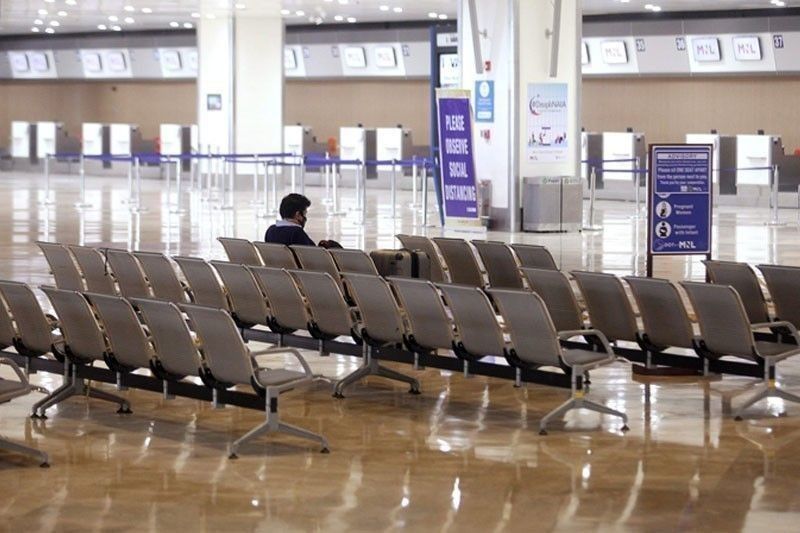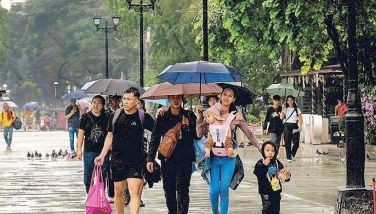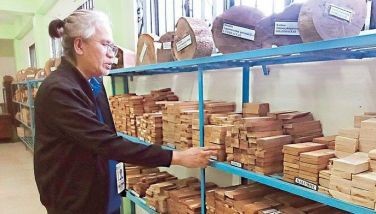IATF issues new quarantine, testing protocols amid fears of Omicron variant

MANILA, Philippines — The country’s pandemic task force has issued new protocols for arriving travelers from countries or territories not on the government’s Red List.
The country issued the new guidelines amid fears of the Omicron coronavirus variant that has been detected in several countries. The Philippines has also closed its borders to several countries, as additional protocol.
The new guidelines took effect on December 3, acting presidential spokesperson Karlo Nograles said in a statement late Thursday night.
Fully vaccinated travelers
Fully vaccinated travelers should have a negative RT-PCR test result, taken within 72 hours prior to departure from the country of origin.
Upon arriving in the Philippines, they will undergo facility-based quarantine and undergo another RT-PCR test on the fifth day since their arrival. “Regardless of a negative result, they shall be required to undergo home quarantine up to the 14th day from the date of arrival,” Nograles added.
Partially vaccinated, unvaccinated
Partially vaccinated, those who have yet to be jabs or whose vaccination status cannot be independently validated are required to present a negative RT-PCR test result, taken within 72 hours prior to departure from the country of origin.
They will likewise be subjected to facility-based quarantine and take another RT-PCR test on the seventh day from their arrival. Even if they receive a negative test result, they are required to finish their quarantine at home up to the 14th day from their arrival.
Nograles also said the Department of Transportation has been tasked to ensure that only passengers who comply with the requirement of negative RT-PCR result prior to travel are allowed to board their flights.
Minors meanwhile will follow the testing and quarantine protocol of the parent or guardian traveling with them, regardless of the child’s vaccination status and country of origin, Nograles added.
International passengers who have already arrived and undergoing quarantine shall continue testing and other protocols in place at the time of their arrival.
Red List countries
Filipinos from Red List countries or territories can only enter the country through government-initiated or non-government repatriations, and Bayanihan flights. They can only deplane via Ninoy Aquino International Airport or Clark International Airport.
Nograles said the DoTr is also ordered to ensure airlines’ compliance to these protocols.
“Upon arrival, the individual shall comply with the testing and quarantine protocols as prescribed under IATF Resolution No. 149-A (s.2021),” he added.
Amended metrics
In the same statement, Nograles said the IATF also amended metrics for determining alert level classifications of provinces, highly urbanized cities and independent component cities.
Among the amendments are removing the following:
- One-Week Growth Rate as a metric for escalation from Alert Level 1 to Alert Level 2;
- the escalation of areas under Alert Level 1 to Alert Level 2 if either case classification or total COVID-19 bed utilization increases to moderate risk or higher;
- and the escalation of areas under Alert Level 2 to Alert Level 3 if both case classification and total COVID-19 bed utilization are at moderate risk, or if case classification is at high to critical risk.
Following the revised metrics, the province of Apayao shall be under Alert Level 2 from December 3 to 15. — Kristine Joy Patag
Follow this page for updates on the new COVID-19 variant, dubbed Omicron and originally detected in South Africa. Photo courtesy of the The STAR/Miguel de Guzman
The EU's drug regulator is expected to authorise the first Covid-19 vaccines for the Omicron variant, although they do not target the latest strains.
The adapted vaccines made by Pfizer/BioNTech and Moderna will be discussed during an extraordinary meeting of the European Medicines Agency (EMA).
European nations have been keen to rush through the new generation of jabs so they can start booster campaigns ahead of a feared Covid surge this winter.
The two so-called "bivalent" vaccines protect against the earlier BA.1 strain of Omicron, as well as the original Covid virus that emerged in China in 2019. — AFP
The Department of Health says an emerging Omicron subvariant, BA 2.75, had been detected in two individuals from Western Visayas.
The Department of Health confirms the detection of the COVID-19 Omicron subvariant BA.5 in the Philippines.
The DOH says two individuals from the same household in Central Luzon tested posiive with the subvariant.
Both patients have unknown exposure and have no travel history.
The first cases of Omicron BA.2.12.1 COVID-19 variant have been detected in the National Capital Region and Palawan, the Department of Health says.
The first two cases in NCR have both received their booster shot and are now tagged as asymptomatic and recovered after completing home isolation.
Meanwhile, 14 tourists and 1 local tested positive in Puerto Princesa City on April 29. All cases are now asymptomatic.
North Korea on Thursday confirms its first-ever case of Covid-19, with state media calling it a "severe national emergency incident" after more than two years of keeping the pandemic at bay.
The official KCNA news agency says the case was "consistent with" the virus' highly transmissible Omicron variant. — AFP
- Latest
- Trending































